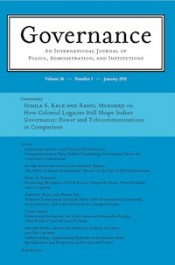Delivering essential services: Does the state matter?
 Last October, Governance published a special issue on state-building in areas of limited statehood. In their contribution, Melissa Lee, Gregor Walter-Drop, and John Wiesel questioned conventional wisdom that the state plays a central role in explaining variation in provision of essential services. Examining data from more than 150 countries, they found “remarkably little evidence of a consistent relationship between statehood and service delivery.” Read the article.
Last October, Governance published a special issue on state-building in areas of limited statehood. In their contribution, Melissa Lee, Gregor Walter-Drop, and John Wiesel questioned conventional wisdom that the state plays a central role in explaining variation in provision of essential services. Examining data from more than 150 countries, they found “remarkably little evidence of a consistent relationship between statehood and service delivery.” Read the article.
In a note on Governance Early View, B. Guy Peters and Jon Pierre commend the article for tackling a “fundamental research question in political science” but argue that the variables used in the study are “inadequate measures of the contemporary state and that the conclusions drawn in this article are therefore misleading.” Peters and Pierre provide a brief overview of difficulties in measuring the state and its activities. Free access to their response to the article.
Melissa Lee and Gregor Walter-Drop defend their approach to the measurement of statehood. This approach “avoids a developed country bias.” Moreover, “Our goal was to challenge the bias of conventional governance research that conflates statehood and service delivery.” The evidence suggests that the “core functions of the state” may not be as necessary for service provision as commonly assumed. Free access to their reply.
